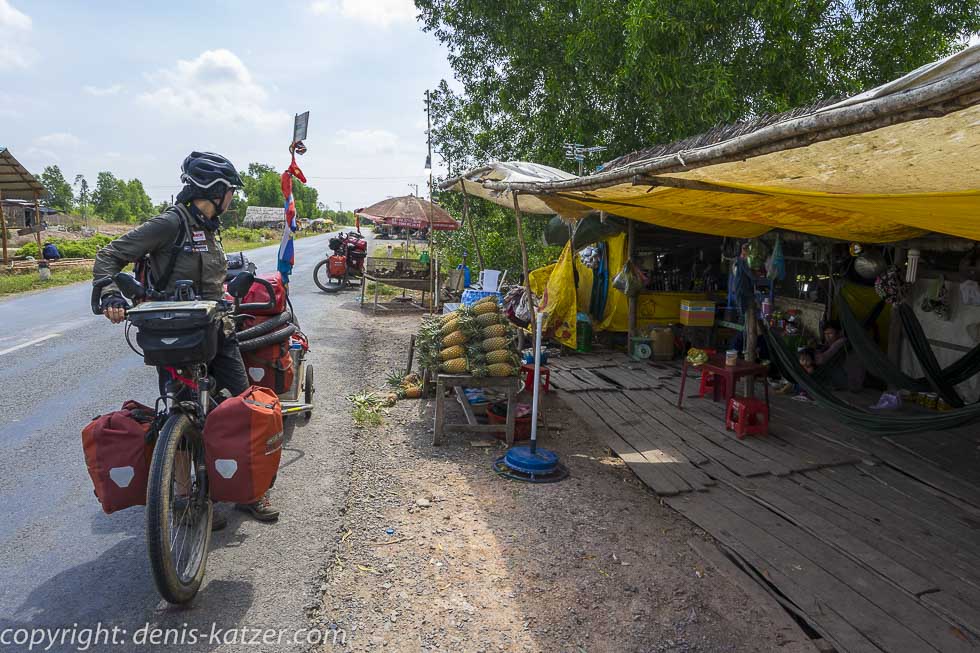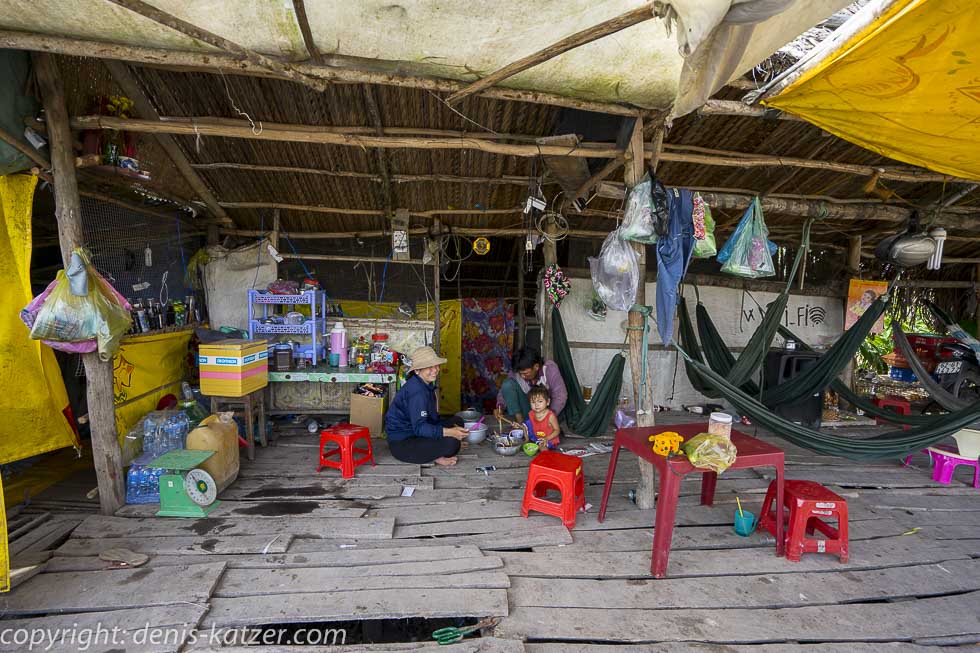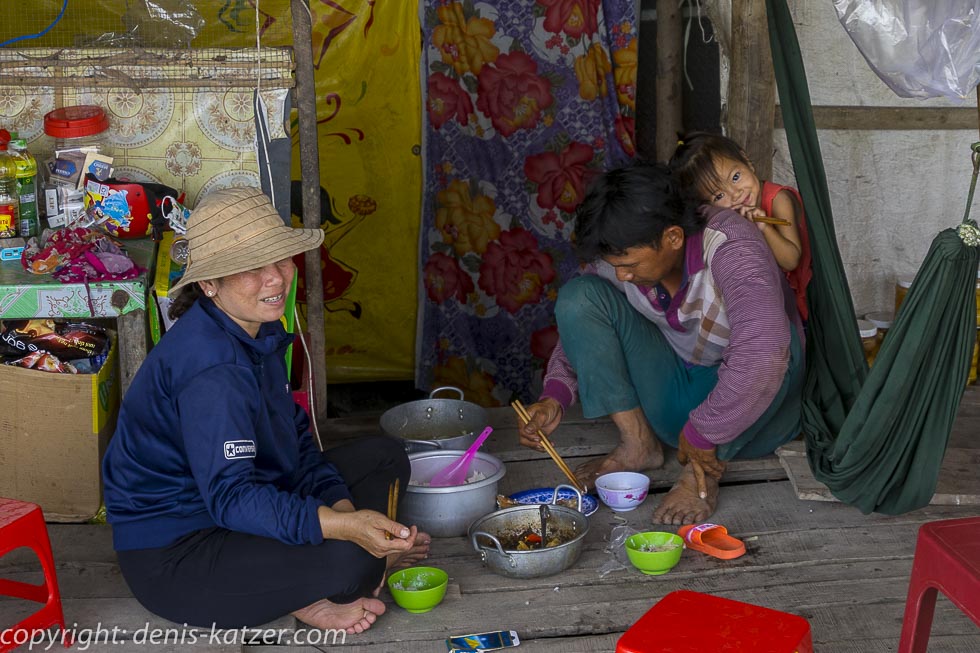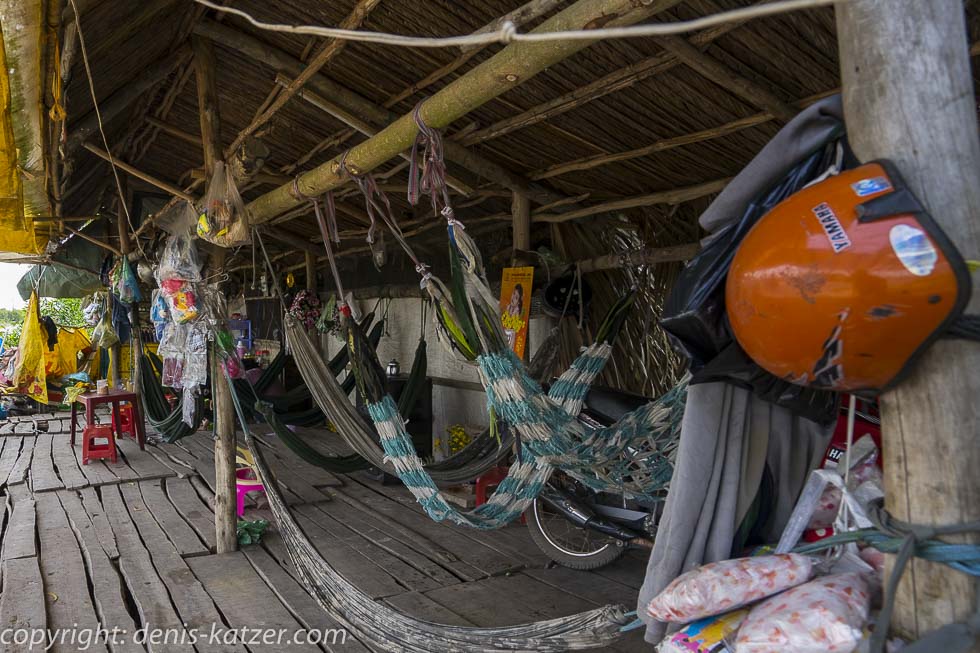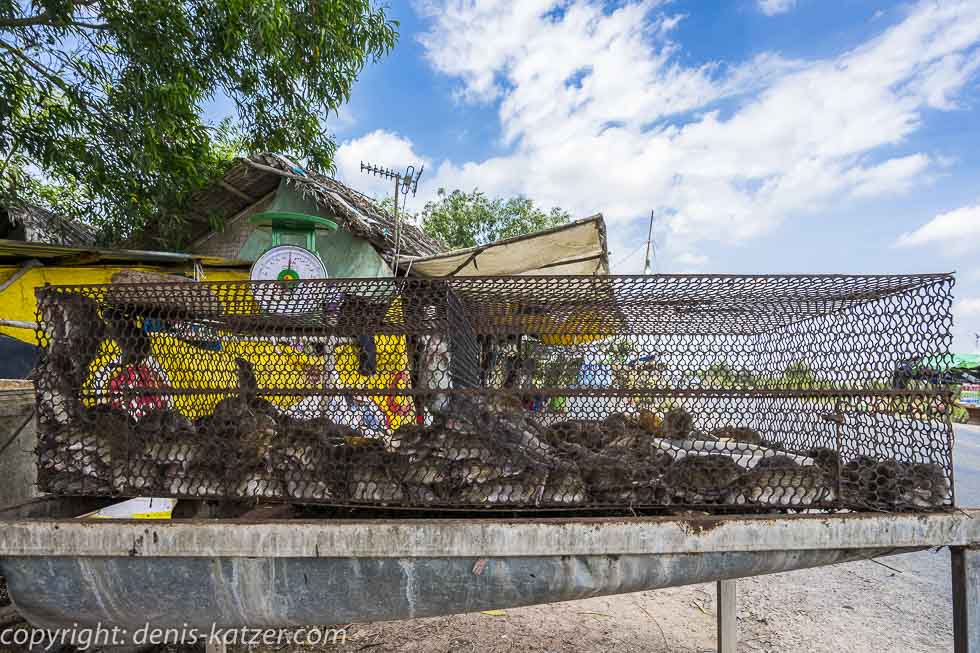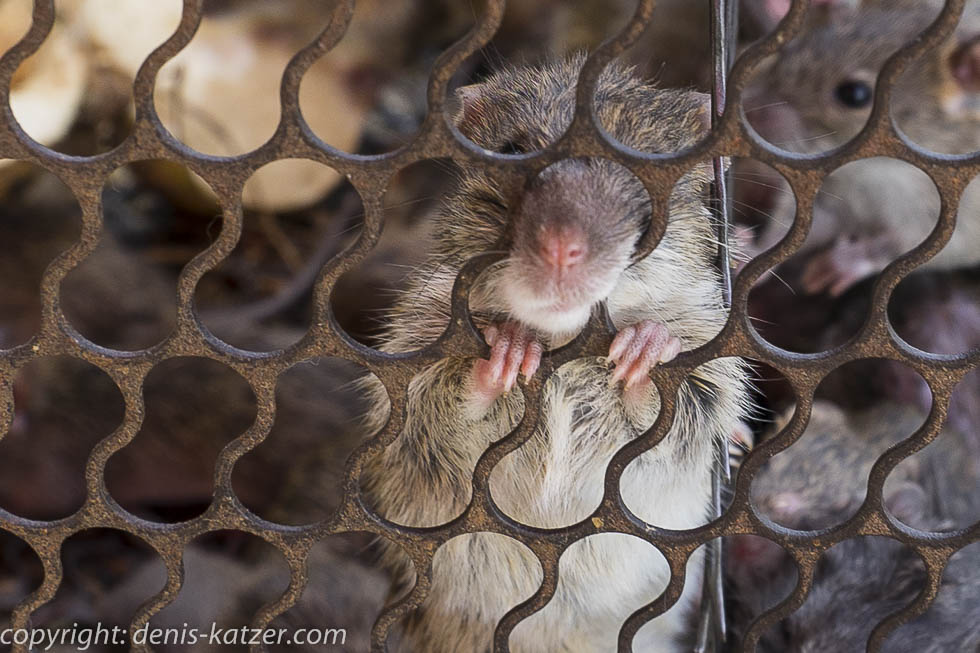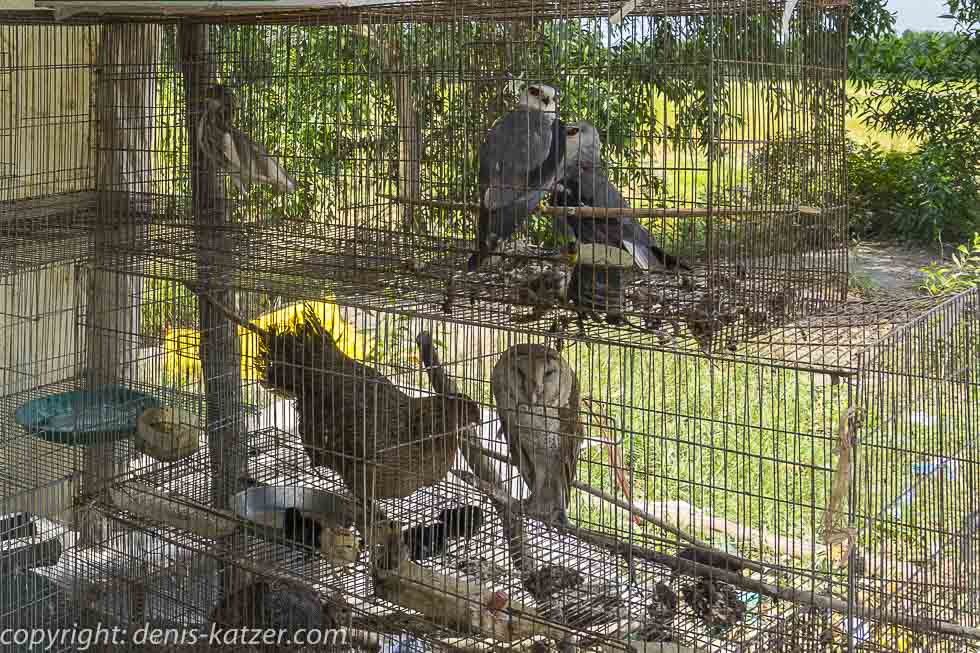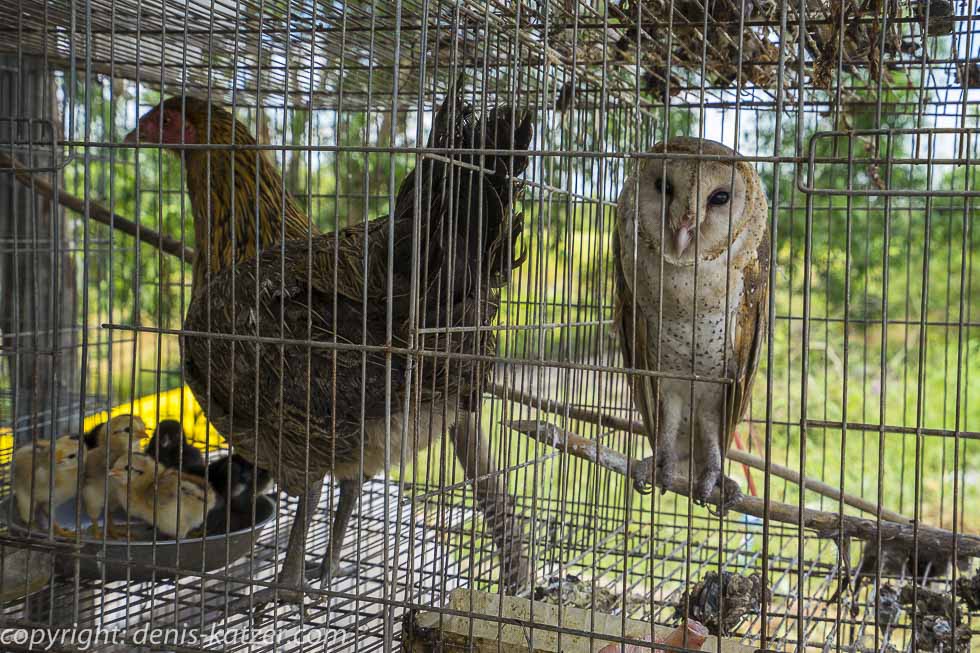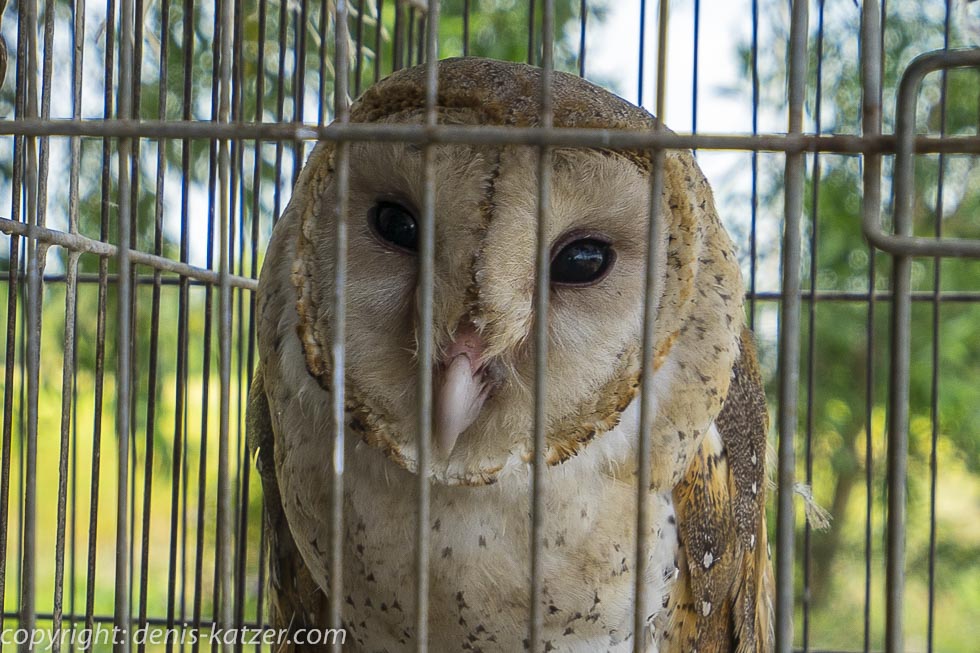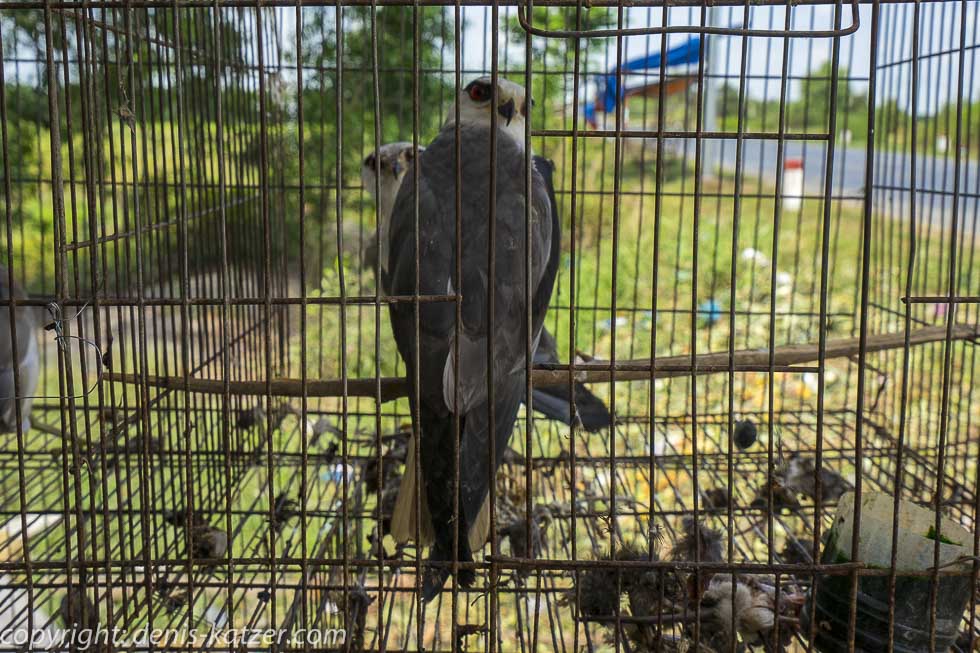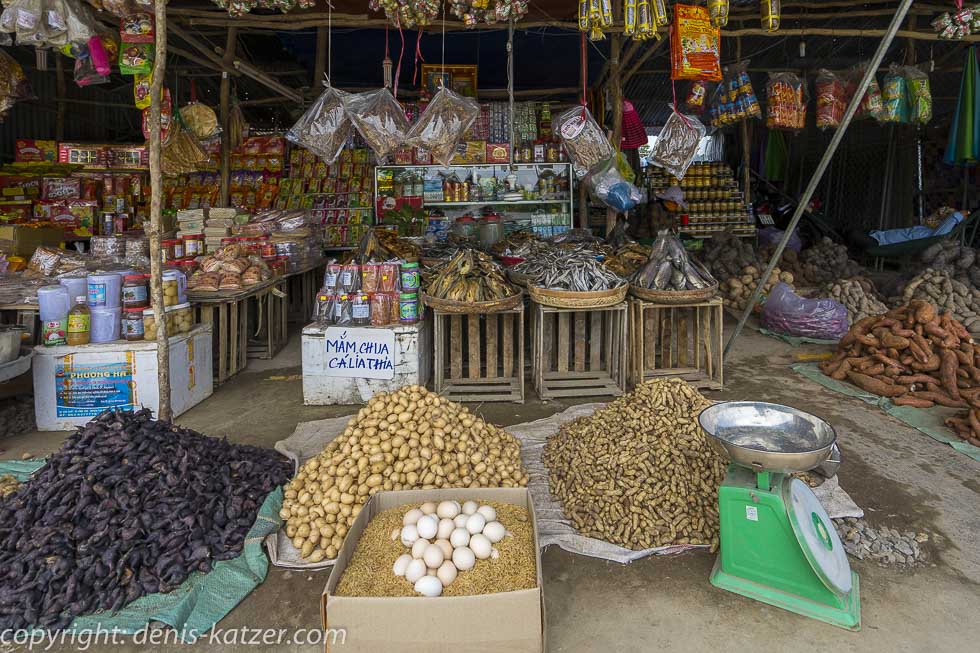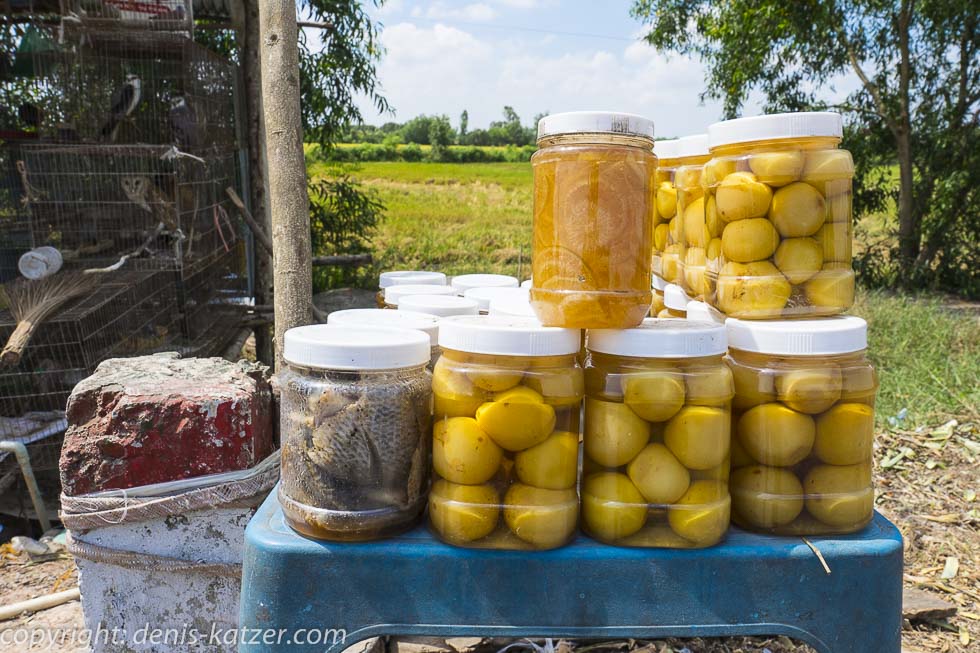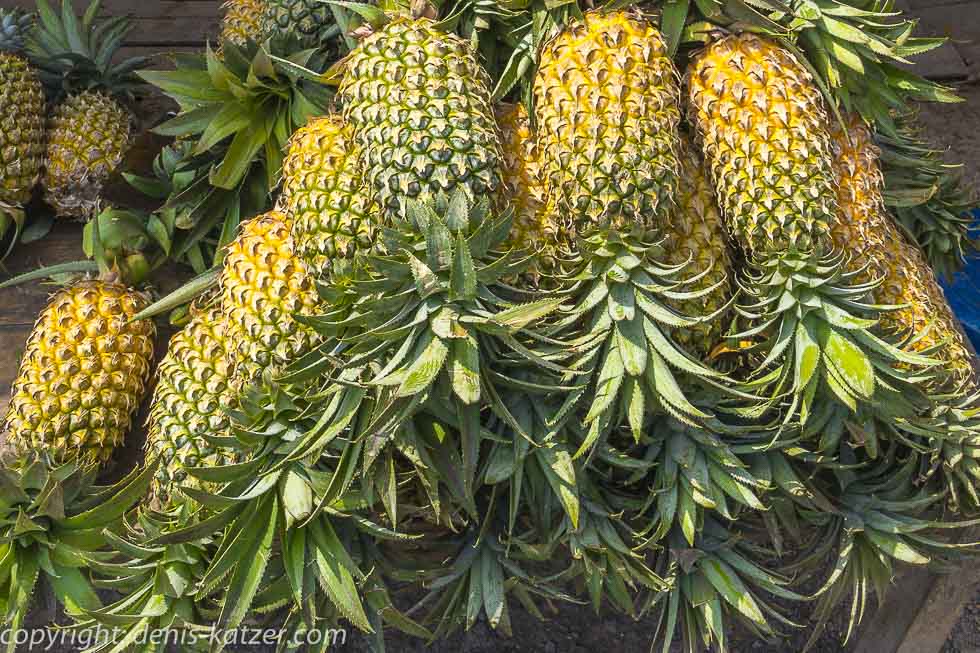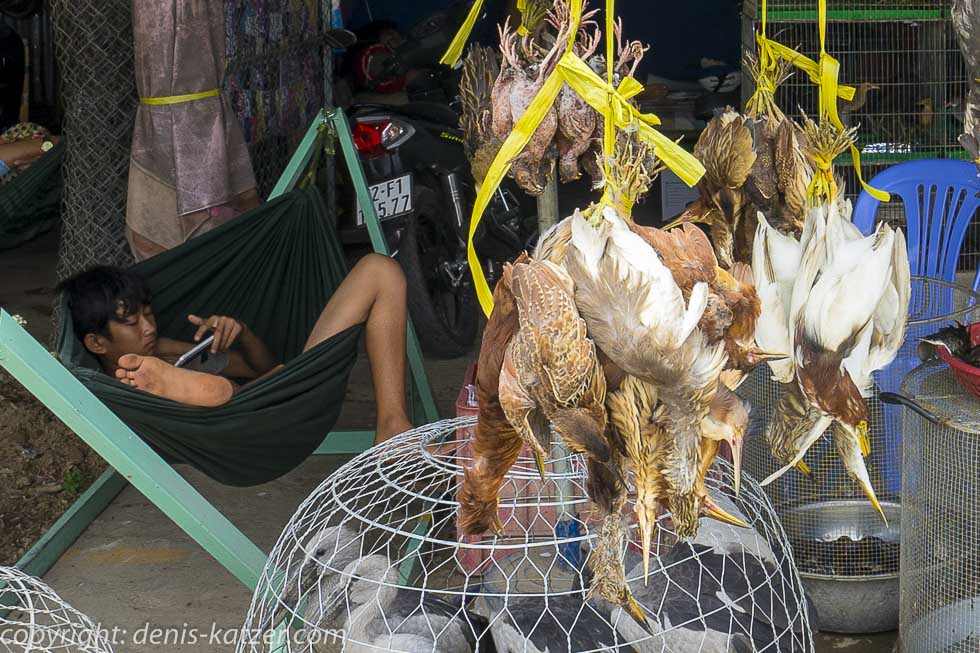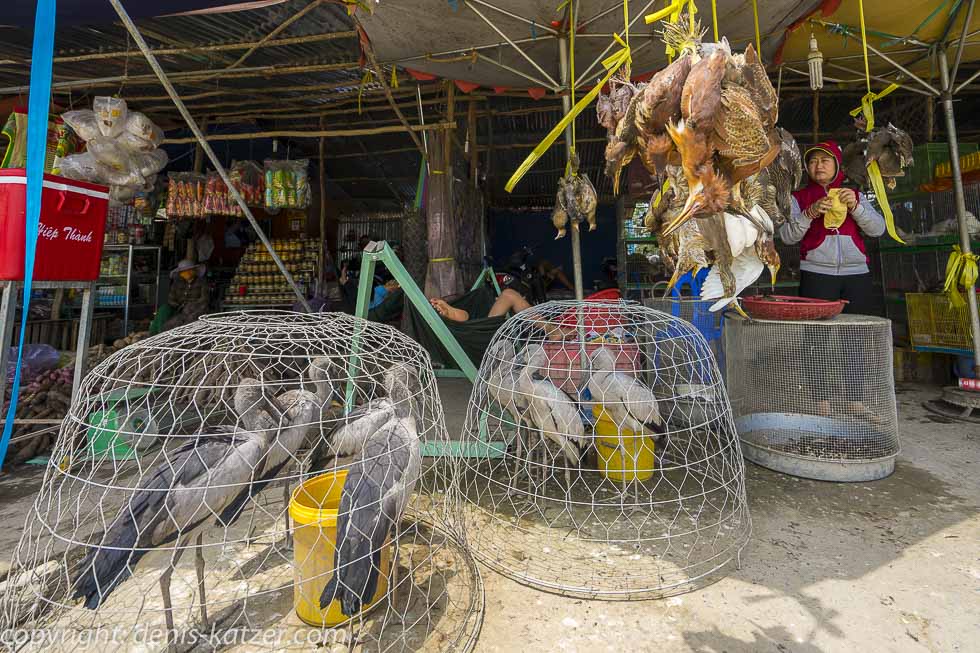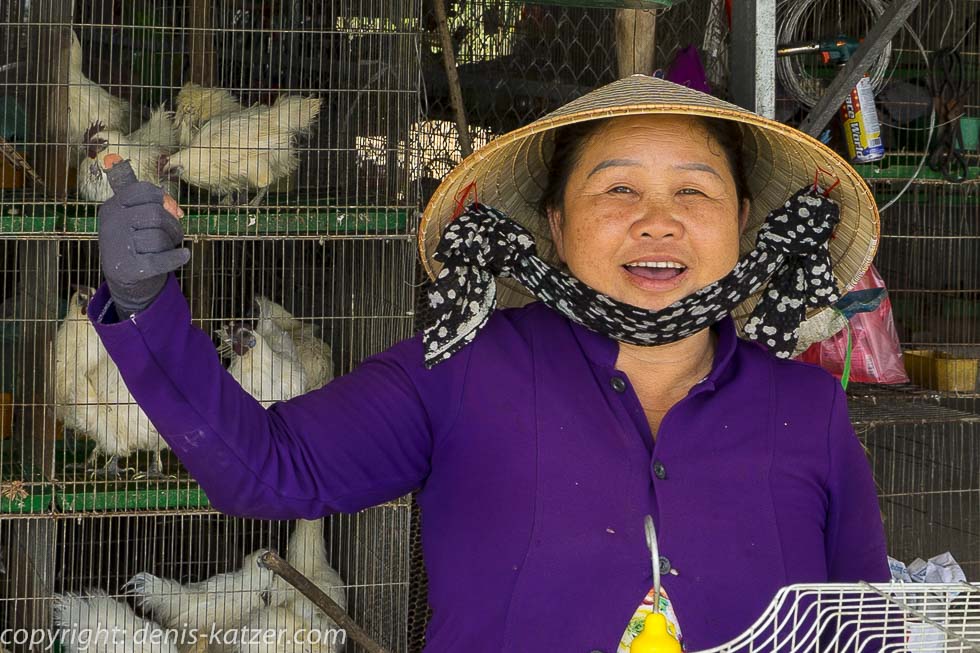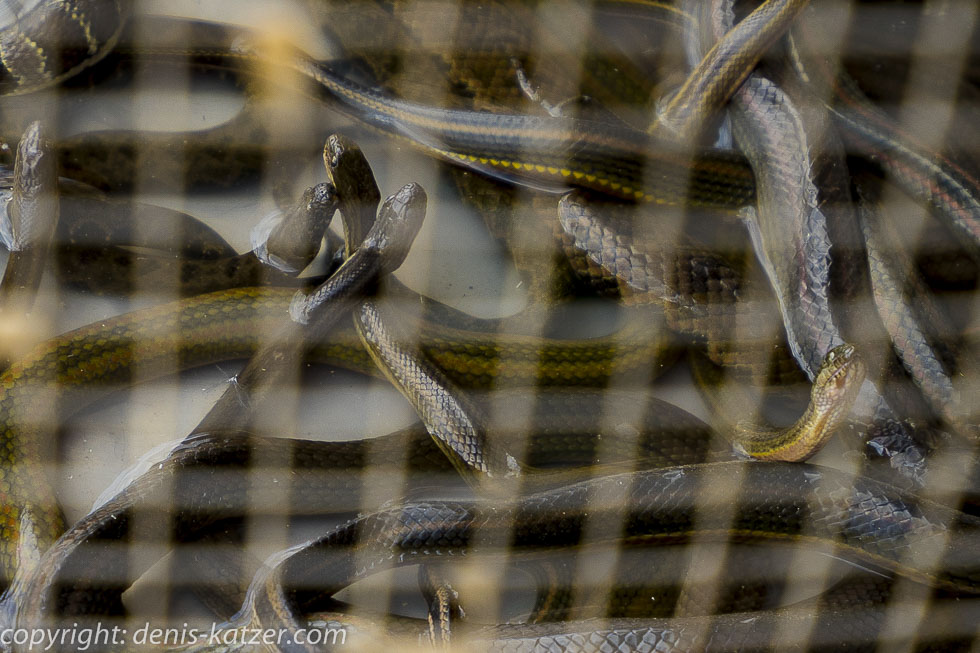
I look into the eye and feel the pain
N 10°39'03.7'' E 106°01'38.2''
Date:
24.03.2017
Day: 633
Country:
Vietnam
Province:
Long An
Location:
Lodge
Latitude N:
10°39’03.7”
Longitude E:
106°01’38.2”
Daily kilometers:
82 km
Total kilometers:
23,084 km
As the crow flies:
49 km
Average speed:
23.0 km/h
Maximum speed:
35.2 km/h
Travel time:
3:33 hrs.
Soil condition:
Asphalt
Maximum height:
15 m
Total altitude meters:
70.154 m
Altitude meters for the day:
100 m
Maximum depth:
12 m
Sunrise:
05:58 pm
Sunset:
6:06 pm
Temperature day max:
35°C
Departure:
7:00 a.m.
Arrival time:
16:00
(Photos of the diary entry can be found at the end of the text).
According to the map, the next overnight stay is about 70 km away, so we expect a shorter and less strenuous day today. Since we left the main road heading west yesterday lunchtime, we have been on a side road with little traffic. Due to the rising heat, we seek out one of the hammock cafés by the roadside early on. I feel miserable, have diarrhea and my shoulder hurts more and more every day. Perhaps the daily distances of around 100 km are taking their toll in the nasty heat? Or is the dirt and garbage in which the country seems to be suffocating in some areas getting on my nerves? We have reached the Mekong Delta. A river that we have been following for several kilometers seems to be fermenting because of the sewage that has been discharged into it. The sun heats up the process even further. Fishermen haul in their nets. Their catch is thrown onto the deck and wriggles in the heat. I wonder how harmful it is to eat the fish? It certainly ends up in restaurants and when I see the broth in which it is sometimes caught, I no longer want to eat fish.
“Have you seen all the rats in the cages?” shouts Tanja. Although I’m too tired to stop, I pull the brakes, put the bike on the stand and take my camera out of the waterproof camera bag. Suffering from a stomach ache and the heat, I kneel down in front of the rat cage to capture the sad situation in a picture. One of the rats has climbed out of the entire tangle of her colleagues, clings to the wire mesh with her front paws and sticks her small, pointed nose through a hole in the mesh. Even if I am a rat, you don’t deserve to be tortured like this, I think. Maybe it’s because of my own physical condition, but I feel serious pity for these creatures, hundreds of which are vegetating in a small, rusty cage on top of each other, on top of each other and on top of each other. Strange, why are we constantly confronted with such terrible situations? Is this due to our sensitive point of view? Is it because of our connection to animals, no matter what breed or species? I don’t know. I would actually like to be a bit more hardened in this matter. Behind the rat cages, a woman, her young daughter and her husband are having lunch. They are the owners of the rats, which it looks like are being sold to passing customers. Due to my lack of knowledge of the language, I am unfortunately unable to find out what these people do with the rats. Will they be eaten? Or are they fed to snakes and birds of prey? I walk around the primitive stall to the other side of the street. What I discover there leaves me speechless. Beautiful birds, such as owls, falcons, partridges and other species I don’t know, sit in cages. “You’ve got to see this!” I shout to Tanja, who is waiting on the other side of the road by the bikes. “No, I don’t want to see that!” Meanwhile, I photograph the birds of prey behind bars. Will they be eaten? Are the rats meant for her? Are they bought by rich people as caged birds to show them off? Again, I get no answers. The fact is, however, that these rare and beautiful creatures of the air spend their lives behind bars, waiting for buyers in the shade at 35°C. Where else can the stall holder catch such birds? Perhaps there are still many of them in the Mekong Delta?
We say goodbye to the family and cycle on. Our mood is not the best because of what we have just experienced. A market with lots of bird stalls suddenly appears in front of us. Again, I make the effort to take a closer look. Here the birds have been hung by their feet en masse. I am stunned, go closer and see that the poor animals are still alive. My thermometer shows 55 °C in the sun. This is the temperature they have to withstand hanging upside down on a peg. A bird opens its eye and looks at me. I am downright terrified. The look is broken and sorrowful. The suffering being here has resigned itself to the coming death. Seems to have given up. What would you feel and think if you were tied up alive by your feet and hung upside down in extreme heat? What would you think if other two-legged inhabitants of our planet were constantly walking past you, laughing out loud and occasionally cutting one of your colleagues off this peg to take it with them? Usually even attached upside down to the luggage rack of a moped, only to end up in a cooking pot later. The accusing look on the bird’s face goes right through me. I would love to buy all the birds here to give them freedom. But how are we supposed to buy hundreds of birds? That makes no sense. Not even if we had the money for it. The sellers would stream out to catch their feathered prey again. Such an action would even promote the dirty business with the creatures. The only way to stop such large-scale cruelty to animals would be a massive government ban. Enforced with the power of the state, with serious punishment for non-compliance. But we are in Vietnam. The country certainly has many problems and environmental and animal protection is not yet a primary goal.
I get up and walk past the stalls. It smells of bird droppings in every nook and cranny. Two large wire baskets stand in front of me in the sun. There are 30 to 40 snakes swarming around. They don’t make a happy impression either. How could you? If they were free, they would hide from the heat under a rock and rest so that they could go hunting at night. “Hello!” shouts a sales clerk with a laugh. “Hello!” I reply. I would love to tell her what suffering she is creating here. But do I have the right to do that? She earns her living here. Perhaps feeds her family. She does not seem to be aware that the price for this is the death and endless suffering of many creatures. Of course, as an observer from a rich country, it’s easy for me to talk here. But where is the solution? How can we put an end to such abuses on our planet? Education, enlightenment, compassion and empathy are of great importance. If children understand from an early age that animals are not commodities, that they can feel joy and pain, that it is vital for humanity to live in harmony with them and not exterminate them, then we could really make a difference. However, governments must be held accountable for this.
“It should be here,” I say, looking at my GPS. “But there’s no guest house here,” Tanja says. “Right, that’s why I said it should be here. I’ll ask the man over there,” I say. He points down the road and tells me that there’s a hotel about four kilometers away. “I don’t understand. There must be a lodge here too,” I say to Tanja again. “Maybe it’s that house there?” she replies, pointing to a new building that looks nothing like a lodge or a hotel. “Hm, but then why is the man here sending us on? I’d better go and see for myself, just to be on the safe side.” It turns out that we are right in front of the lodge whose coordinates I have saved in my GPS. We push our bikes into the garden and are still wondering why the neighbor wanted to send us on. “How much does a room cost?” I ask the bored-looking woman. She is obviously struggling to answer. “I don’t understand. Maybe you do?” I ask Tanja. “I don’t know why she doesn’t give us a price,” she muses, holding out our phrase book. “Bao nhiêu là một căn phòng?” (How much does a room cost) it says. The woman draws something on a newspaper. How many hours do you want to stay?” we understand. “Hey? Hours? We want to stay one night,” I reply. After a long back and forth, we realize that we have ended up in a hotel by the hour again. It takes us a while to make it clear to the woman that we want a normal overnight stay so that we can continue our journey tomorrow morning at 7:00 am. As she is still quite uncooperative, we say goodbye and cycle on in the shade at 35°C. “When will the hotel be here?” asks Tanja, “In four kilometers.” When we have clocked up the four kilometers on our speedometers, we stop next to a street café and sit down exhausted in one of the low plastic children’s chairs. We order an ice-cold Coke, which isn’t available because the restaurant doesn’t have a fridge. A girl wants to give us ice cubes in a shovel. Not a bad idea, but we see every day how the ice is produced, transported, maltreated and finally stored. The hygienic conditions in this whole process make us tear our hair out and are certainly partly responsible for the spread of diseases. “I can’t take any more,” I say apathetically. “I’m pretty exhausted too,” yawns Tanja. We ask a man at the next table about the hotel and learn that we have to pedal at least another ten kilometers to reach it. “And when we get there, we don’t know if they’ll accept our Ajaci and let the bikes in,” I point out. “Should we turn back?” “You mean back to the 24-hour store?” “Yes.” “Maybe not a bad idea,” I ponder. A quarter of an hour later, we struggle out of our little chairs. We get on our bikes and ride the four kilometers back. Again, the negotiations with the woman are extremely difficult and nerve-wracking. In the end, we reach a fair agreement. We are allowed to stay from 4 p.m. until 7 a.m. and pay 110,000 dong. (4.51 €) A very reasonable price for the new, clean, windowless rooms with AC. In the evening we walk along the banks of the river on a pitch-black night to find something like a restaurant. After 20 minutes we give up and return to our accommodation. Tanja unpacks one of the last travel lunches (freeze-dried food). We always have a few packs of this with us for emergencies. We pour hot water over it, which we get from our lodge owner, and enjoy the delicious food…
If you would like to find out more about our adventures, you can find our books under this link.
The live coverage is supported by the companies Gesat GmbH: www.gesat.com and roda computer GmbH http://roda-computer.com/ The satellite telephone Explorer 300 from Gesat and the rugged notebook Pegasus RP9 from Roda are the pillars of the transmission. Pegasus RP9 from Roda are the pillars of the transmission.
